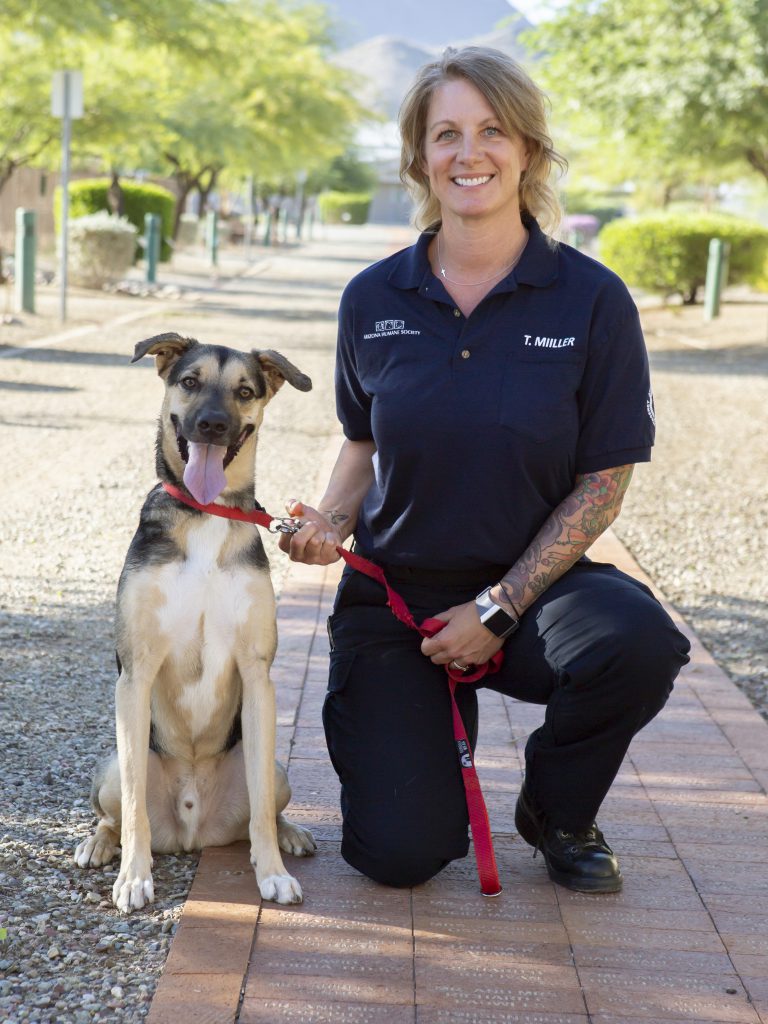Our latest installment in our Stories from the Street series is an interview with Tracey Miiller from the Arizona Humane Society. Tracey is the Field Operations Manager at the Arizona Humane Society and had a 21-year career in law enforcement before moving over to the Arizona Humane Society.
She spoke with Evertel CEO Jeff Halstead about how law enforcement can utilize their local Humane Society and how her organization uses Evertel. She shared a story about a massive bunny rescue her team performed that saved 227 bunnies from a tiny shed. Read the full story and Tracey’s thoughts below.

Interview with Tracey Miiller from the Arizona Humane Society
Jeff Halstead: You had a long and very successful career in policing, retiring as Lieutenant in Phoenix PD after 21 years of service. How does your experience in police work benefit your current job with the Arizona Humane Society?
Tracey Miiller: Having had experience in law enforcement has been so beneficial here at the Humane Society because my team, although we are civilians and we have no sworn capacity, we still do the beginning stages of cruelty investigations. We have contracts in nine cities throughout the valley, and in seven of those cities we are literally the first responders that will go out and investigate a call for service. It would be similar to a civilian in a police department who responds to a non-injury accident or a burglary that is over eight hours old.
Unfortunately the team had minimal direction in the law enforcement world before I came on board. It has been beneficial for them to see how the law enforcement world works, but it has helped us because it has increased our ability to run investigations and it has made our investigations stronger. Our relationship with the law enforcement agencies in all our contracted cities has grown tremendously. I come with the experience also of having the knowledge of the state statutes and how you manage a court testimony. I didn’t know before I got this job, but these guys testify in court almost more than we ever did in law enforcement.
Jeff: Although we are retired cops, we can still provide messages of support and encouragement especially during these challenging times. Is there a message you would send to current first responders who are dealing with these national issues?
Tracey: First and foremost I would say don’t falter or question your beliefs. We all got into this job for the main reason of helping people and to put bad guys away, and in the whole history of law enforcement, there have always been these ups and downs of the community and politics and law enforcement. We have always come through strong and more times than not we come out stronger.
We didn’t become police officers to become political so I would say don’t pay attention to the political nature of the people trying to tell you how to do your job because you know how to do your job and there are so many hundreds of thousands of people out there who support what you do and support your family for what you do. Keep your head on a swivel, be aware of your surroundings, and this too shall pass.
Jeff: You were the first animal rescue organization in the nation on Evertel. Can you explain to others how your agency is using Evertel today?
Tracey: How we use Evertel is twofold right now:
1. My team and several other members of the Arizona Humane Society are part of the Arizona Emergency Response Team. So we can be deployed statewide to natural or human disasters. We can respond to assist the Red Cross in setting up a shelter for the animals. Red Cross will set up the human shelter usually at a high school, and then we also respond and we will set up an animal shelter in close proximity because a lot of times people don’t have places to go for an evacuation for say a forest fire or flood. After law enforcement and fire has deemed the scene safe, we can go back into the residences and rescue the animals they may have had to leave behind. In doing so, we utilize Evertel because we are working with so many different organizations.
For example, we got deployed last summer to the Woodbury Fire, so we were working with law enforcement, the fire department, the animal control officers for that county, the national people who were there, and the Red Cross. We had the ability to work with them using Evertel even if they didn’t have the app. I could add them as Guests for that time being and all our information could be shared seamlessly, which has proven to be such an asset in these types of situations. Often times everyone back at the shelter is wondering how we are doing, do we need help, and do they need to send reinforcements, so Evertel is a forum for us to share that information not only with our own staff but also with those in other organizations.
2. Another big way we use it is for large-scale investigations. We deem a large-scale investigation as anything over 10 animals, but it’s usually 40, 50, 60, and above. We’ll go in after law enforcement has served their search warrant and rescue the animals. We capture them, we transport them, we take them back to our emergency trauma hospital, we treat them, and we hang onto them for the remainder of the time. We provide that organization with a packet of the case that will include medical, videos, photos, scene observations, etc.
We’re working with organizations that may not have the Evertel app. I can add them as Guests and we can be sharing information across the law enforcement lines and the humane society lines. And it has streamlined how we work our large-scale investigations and it has made things flow a lot quicker and more efficiently.
Jeff: I remember you telling me about a massive ‘bunny rescue’ recently. How do you plan for these very sensitive but important operations, and how does Evertel help?
Tracey: This was a gentleman who was breeding and keeping domesticated rabbits and selling them on Craigslist for meat. One of my employees is actually a trained chef and so she said there’s no way these were meat rabbits and no chef in the world would eat these. They were truly domesticated bunnies.
Last year we served a search warrant at the same property and brought in 166 bunnies in one swoop, and we thought that was incredible. Well this summer we got a call from a concerned citizen who had gone there because he was also selling these bunnies as pets. He would take people into his shed where he was keeping them, and it was maybe 300–400 square feet with bunnies stacked on top of bunnies. He took her in there to show her a rabbit and the lady came out just devastated and called us. We recognized the address, went there, and he told us we couldn’t come on his property. We notified the police department who did undercover work and got enough probable cause to serve another search warrant. The detective that did the undercover work told us there are maybe 70 bunnies in there. The total number ended up being 227 bunnies. 227 bunnies for a team of 12 to take in was very time consuming and exhausting.
We had to wear full suits in August and it was 115 degrees working in a 400 square foot shed. We rotated our teams out every 15 minutes, but again Evertel was so helpful in this situation. We were working with a different organization, and we were able to communicate with them prior to the search warrant on what their plan of action was. We presented them with our action plan and how we planned on capturing the rabbits and what we would do if we ran into sick and injured.
At the pre-briefing, we made sure we all had the app up and running and we utilized it the whole time we were at the scene both to update our staff back at the shelter as well as the police command staff who was wondering how their search warrant was going. It was a very daunting and long and hot day, but without Evertel it would have been so frustrating to have had to check your emails periodically and to stop and take your gloves off to update your boss. But they know, I will be updating Evertel every 10–15 minutes, and we were never bothered with any other people trying to get information while we were there.
Jeff: During these wildfires, hurricanes, and other major weather events, your role is critical to save thousands of animals. What would you like to share with other police departments about how they can help organizations like yours work closer with them?
Tracey: Every fire, law enforcement, humane, animal control organization needs to have something on their website that talks about having an evacuation plan not only for you and your family but for your animals. A lot of times these wildfires will come out of nowhere and you have two minutes to get out and you don’t have an evacuation package for your dog. Maybe your dog is going to need medicine, food, a leash, a collar, a crate to keep them in. We have a very extensive evacuation plan on our website and a list of things that you can check off and have sitting by the door ready to go. (Note: Click here to see this page on the Arizona Humane Society website.) I think everyone needs to have that on their website and they need to push that.
Animal rescue groups are very valuable resources in these situations. We see it in videos: people won’t leave because they don’t have place to go with their animal and they refuse to leave their animal behind. If you utilize a humane resource or an emergency response team, you have a location for the people to go to evacuate. You no longer have to put your team at risk to go in and save the humans on top of the roof with their dog because they refused to leave their animal behind. We can offer shelter for the animals and the humans with Red Cross to get them out of there.
Let us come into your scene and let us help you not only get the humans out, but get the animals out as well.
Jeff: Any closing comments?
Tracey: Get out and meet your local humane team. The humane society is significantly different than your animal control officer. We have two different missions and operate completely differently. Your humane team often operates on donations only. They are not government funded, they are not grant funded. Literally our entire organization runs off donations. I would encourage you to go out and meet your local humane people and see what they can do for you. You might be amazed by some of the things they have to offer.
Our goal is that every pet deserves a good life. The Humane Society is proud and thankful to be part of the Evertel family because it has helped us in many of our investigations and I know it is only going to assist us in the future as well.
Thank you for your time, Tracey. We are proud to have such a diverse range of industries and officers on Evertel and we will continue to share their stories with you.





